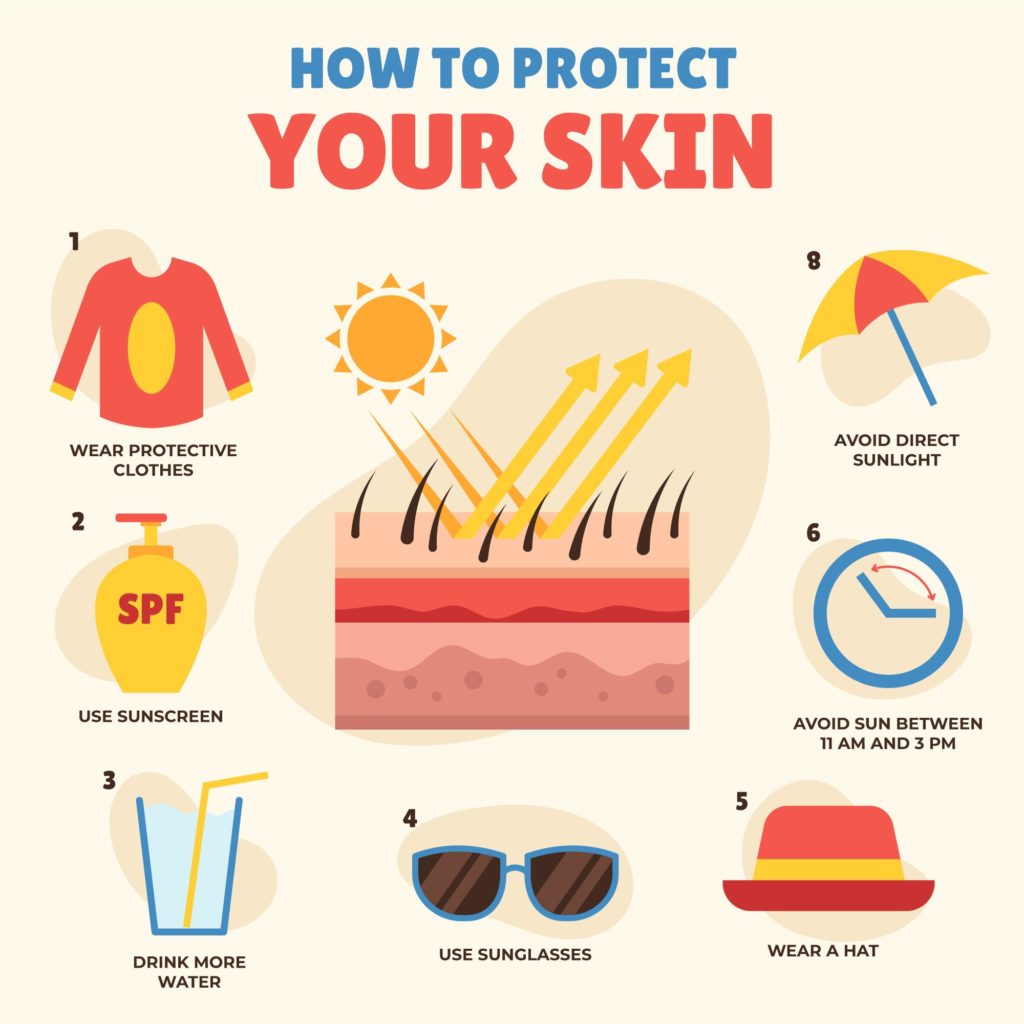Introduction
- Importance of skin protection
- Overview of what the article covers
H2: Understand Your Skin Type
- Different skin types and their needs
- How to identify your skin type
H3: Daily Skincare Routine
- Cleansing: The importance of a gentle cleanser
- Moisturizing: Choosing the right moisturizer for your skin type
H3: Sun Protection
- Importance of sunscreen
- Choosing the right SPF and application tips
H3: Diet and Hydration
- Impact of diet on skin health
- Importance of staying hydrated
H2: Environmental Factors
- Effects of pollution on skin
- Protection against environmental stressors
H3: Skincare Products
- Choosing non-comedogenic products
- Reading labels and avoiding harmful ingredients
H2: Healthy Habits for Skin
- Importance of adequate sleep
- Managing stress for healthier skin
H3: Exercise and Skin Health
- Benefits of exercise for skin
- Post-exercise skincare routine
H2: Special Considerations
- Skincare during pregnancy or medical treatments
- Skincare for different age groups
H3: Recognizing Skin Issues
- Common skin problems and their causes
- When to seek professional help
H2: Natural Remedies vs. Medical Treatments
- Pros and cons of natural skincare remedies
- Overview of medical skincare treatments
H1: Conclusion
- Recap of key points on skin protection
- Encouragement for maintaining a healthy skincare routine
Article: How to Protect Your Skin
Our skin is not just a superficial covering but a vital organ that requires care and protection. Understanding how to protect your skin is crucial for maintaining its health and appearance. Let’s delve into effective strategies to keep your skin healthy and glowing.
Understand Your Skin Type
Before embarking on a skincare routine, it’s essential to know your skin type. Whether you have oily, dry, combination, or sensitive skin, each type has specific needs. Determining your skin type helps in selecting the right products and treatments tailored to its requirements.
Daily Skincare Routine
A consistent daily skincare regimen forms the foundation of skin protection. Start with a gentle cleanser that effectively removes dirt and impurities without stripping away natural oils. Follow up with a suitable moisturizer that hydrates your skin adequately, locking in moisture throughout the day.
Sun Protection
One of the most critical aspects of skin protection is shielding it from the sun’s harmful UV rays. Always apply a broad-spectrum sunscreen with an SPF of at least 30, even on cloudy days. Reapply sunscreen every two hours when outdoors, and wear protective clothing and sunglasses for added defense.
Diet and Hydration
Healthy skin starts from within. A balanced diet rich in antioxidants, vitamins, and essential fatty acids promotes skin health. Additionally, staying hydrated by drinking plenty of water helps maintain skin elasticity and flushes out toxins.
Environmental Factors
Environmental pollutants and stressors can take a toll on your skin’s health. Protect your skin by minimizing exposure to pollution, using barrier creams, and cleansing thoroughly at the end of each day to remove impurities.
Skincare Products
When choosing skincare products, opt for non-comedogenic formulations that won’t clog pores. Read product labels to avoid harsh chemicals and allergens that could irritate your skin. Natural ingredients like aloe vera and green tea can provide soothing benefits without causing adverse reactions.
Healthy Habits for Skin
Incorporating healthy habits into your lifestyle contributes significantly to skin protection. Ensure you get enough sleep each night as it allows your skin to repair and regenerate. Managing stress levels through relaxation techniques or hobbies can also prevent stress-related skin issues.
Exercise and Skin Health
Regular physical activity promotes circulation, delivering oxygen and essential nutrients to your skin cells. After exercise, cleanse your skin to remove sweat and bacteria, followed by moisturizing to maintain hydration and elasticity.
Special Considerations
Certain life stages and conditions may require tailored skincare approaches. During pregnancy or medical treatments, consult with healthcare professionals to ensure safe skincare practices. As we age, adjusting skincare routines to address changing needs becomes essential for maintaining skin health.
Recognizing Skin Issues
Understanding common skin problems such as acne, eczema, or signs of aging helps in early intervention. If over-the-counter remedies don’t alleviate symptoms, seek guidance from a dermatologist for personalized treatment options.
Natural Remedies vs. Medical Treatments
While natural remedies can complement skincare routines, medical treatments offer targeted solutions for specific skin concerns. From prescription medications to advanced procedures like laser therapy, dermatologists can provide effective treatments tailored to your skin’s needs.
Conclusion
Protecting your skin requires diligence and a proactive approach. By understanding your skin type, adopting a daily skincare routine, practicing sun protection, maintaining a healthy diet and hydration, and addressing environmental factors, you can safeguard your skin’s health and vitality.
FAQs
1. What is the best sunscreen for sensitive skin?
- Answer: Look for mineral sunscreens with zinc oxide or titanium dioxide, as they are gentle on sensitive skin.
2. How often should I exfoliate my skin?
- Answer: Exfoliate 1-3 times per week, depending on your skin type and the exfoliation method used.
3. Can diet affect my skin’s appearance?
- Answer: Yes, a balanced diet rich in fruits, vegetables, and omega-3 fatty acids can improve skin health.
4. What should I do if I have a sunburn?
- Answer: Apply aloe vera gel or a moisturizing lotion, drink plenty of water, and avoid further sun exposure.
5. Is it necessary to wear sunscreen indoors?
- Answer: Yes, UV rays can penetrate windows, so wearing sunscreen indoors is recommended, especially if you’re near windows or spend extended periods indoors.
I hope you find this article helpful in understanding how to protect your skin effectively.
